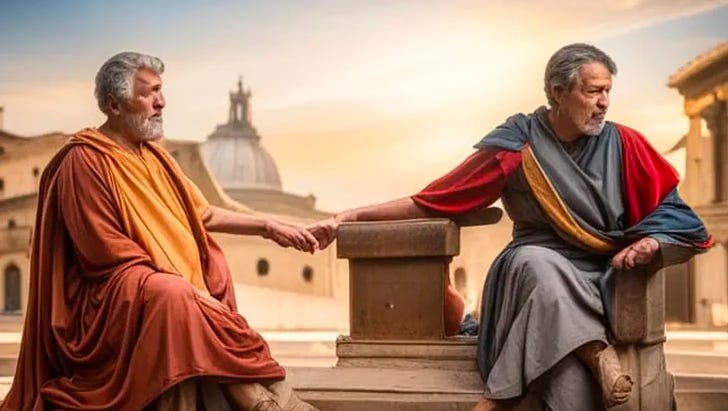BOOK SUMMARY: Manville & Ober: "The Civic Bargain: How Democracy Survives"
A brief reading note/summary...
Manville, Brook, & Josiah Ober. 2023. The Civic Bargain: How Democracy Survives. Princeton: Princeton University Press <https://www.amazon.com/dp/B0BZFXYLPW/>.

Manville and Ober argue that democracy can and should be renewed in the face of its current challenges and crises. The authors draw on their expertise to compare and contrast four historical cases of successful democratic experiments: classical Athens, republican Rome, parliamentary Great Britain, and the United States. They identify common features and lessons that enabled these democracies to survive and thrive for centuries. They then try to apply them to contemporary liberal democracy.
The book’s main thesis is that democracy is not about getting everything we want, but about agreeing on a shared framework for pursuing our often conflicting aims. Democracy is a bargain or a pact that citizens make with one another to try to guarantee their civic rights of freedom, equality, and dignity, and to fulfill their civic duties of self-government, compromise, friendship, and education. This “civic bargain” is the key to sustaining democracy.
The authors define democracy as “a form of collective self-government in which there is no boss except one another”. They argue that this requires a mutual agreement among citizens on:
who counts as a citizen,
how decisions are made, and
what are the rights and responsibilities of citizenship.
The civic bargain is not a one-time deal, but a continuous negotiation that needs to be updated and renewed in response to changing circumstances and challenges.
The book examines their four historical cases—classical Athens, republican Rome, parliamentary Great Britain, and the United States—of what they call democracy in detail, highlighting achievements and failures, similarities and differences, and their relevance for today. This historical part is of enormous interest—is, indeed, a treasure for all time, as it helps us understand clearly the events that happened in the past and which (human nature being what it is) will, at some time or other and in much the same ways, be repeated in the future.
The authors show how each case developed its own version of the civic bargain, based on its specific context and culture, but also how each case shared some core features that made democracy possible and durable. These features include:
institutional design that balances power and participation;
trust and compromise that foster cooperation and consensus;
organic evolution that allows for adaptation and innovation;
civic education that reinforces the norms and values of citizenship; and
civic friendship that promotes mutual respect and solidarity.
How about applying the lessons from history to the current situation of liberal democracy?. Manville and Ober look the challenges and crises of liberal democracy today—populism, polarization, inequality, corruption, authoritarianism, nationalism, terrorism, and more—in the face. They call for a renewed commitment to the civic bargain from both citizens and leaders.
They conclude that democracy can stay alive—but only if we keep it so. They urge readers:
to embrace their role as democratic citizens,
to participate in public affairs,
to respect their fellow-citizens,
to compromise on their differences,
to educate themselves and others about democracy, and
to renew their civic bargain with one another.
But these will work only if citizens think critically about what democracy means to them, what it requires from them, and what it can offer them.




